If you’re looking for the best vegetable oil substitutes, this list of 19 easy alternatives should help.
Vegetable oil is typically used in baking, cooking, and many other recipes that call for an all-purpose oil.
But what can you do if you don’t have any vegetable oil on hand or your grocery store just ran out? Or if you’re simply looking for a healthier substitute?
Today, I’ll share 19 easy vegetable oil substitutes that work equally well or even better for some recipes.
Keep reading to understand how to use these handy ingredients instead of vegetable oil in cooking and baking.
Table of Contents
- 19 Best Substitutes for Vegetable Oil To Use in Cooking or Baking
- 1. Coconut Oil
- 2. Olive Oil
- 3. Flaxseed Oil
- 4. Ghee (Clarified Butter)
- 5. Avocado Oil
- 6. Hempseed Oil
- 7. Butter
- 8. Applesauce
- 9. Pumpkin Seed Oil
- 10. Sesame Seed Oil
- 11. Almond Oil
- 12. Peanut Oil (High Oleic)
- 13. Yogurt
- 14. Canola Oil
- 15. Sunflower Oil
- 16. Palm Oil
- 17. Shortening
- 18. Safflower Oil
- 19. Mashed Fruit or Fruit Puree
- What is Vegetable Oil?
- Frequently Asked Questions
- Which vegetable oil is the healthiest?
- Final Words
19 Best Substitutes for Vegetable Oil To Use in Cooking or Baking
The best substitutes for vegetable oil are coconut oil and olive oil. In most recipes, you can also use flaxseed oil, butter, and applesauce as vegetable oil substitutes.
You can use the below replacements in a 1:1 ratio for cooking, baking, sauteing, dips, sauces, salad dressing, and drizzling.
1. Coconut Oil

Coconut oil is made from coconut meat through a process called “traction” (basically, the meat is placed under high pressure), which extracts the oil and turns it into a white solid.
It has a very long shelf life, but if you keep it in a hot place, there’s a good chance that its flavor and health benefits will be compromised.
Coconut oil is one of my favorite substitutes for vegetable oil due to its high smoke point (between 350°F – 400°F), which makes it ideal for baking and frying.
When cooking with it, remember to keep the heat low and use it a little bit at a time. This is because coconut oil becomes unstable when heated excessively (this is true for all oils, though).
Coconut oil has almost double the amount of saturated fatty acids as most other oils, making it a solid choice for people looking to beef up their diets with healthy fats.
It also has many nutritional benefits, like boosting metabolism, improving digestion, and reducing inflammation, weight gain, heart disease, and depression.
2. Olive Oil

Olive oil is made by crushing fruits of olives and extracting the oil. It is one of the healthiest oils and should be part of any healthy diet.
It’s a great substitute for vegetable oil if you’re making salad dressings, dips, or drizzling over vegetables because it has a low smoke point (around 320°F).
However, you can also use olive oil for baking at a low temperature if you wish. The flavor will change slightly, but it’ll still be just as healthy.
Olive oil is packed with antioxidants (especially Vitamin E) and contains polyphenols, compounds that provide powerful anti-inflammatory effects.
Extra virgin olive oil is obtained from the first cold press of olives and, unlike other oils, does not undergo any processing, which retains its nutritional benefits and flavor.
It also contains oleocanthal, which is an anti-inflammatory compound that has been known to help reduce the risk of heart disease.
However, extra virgin olive oil can be bitter because of its polyphenols, so I would recommend mixing it with other oils when cooking.
3. Flaxseed Oil
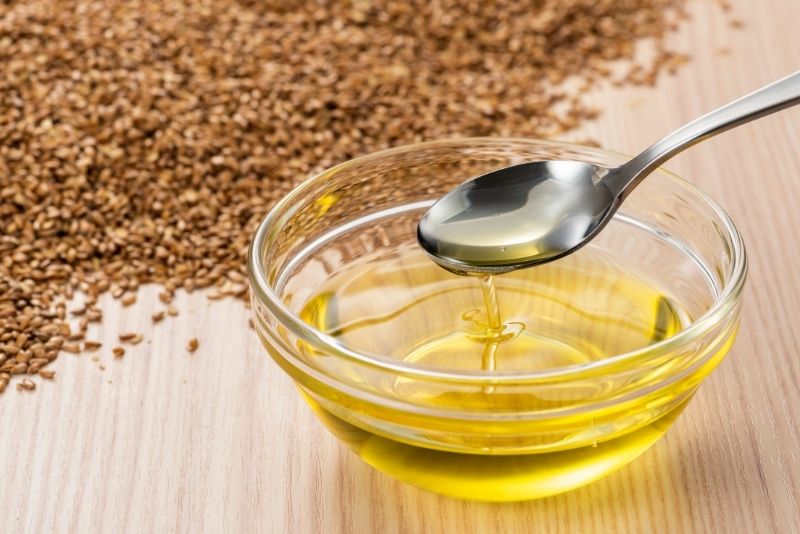
Flaxseed oil is produced from pressed flax seeds and works well as a replacement for vegetable oil.
It has one of the lowest smoking points of any oil (just 225°F), meaning it shouldn’t be used in a recipe that calls for cooking.
However, it’s perfect for marinade and salad dressing. It can also be drizzled over grilled vegetables right before serving.
But like other oils, keep an eye on how much you use because its fat content can sometimes overpower a recipe.
Flaxseed oil is one of the richest sources of healthy omega-3 fatty acids (alpha-linolenic acid), which helps lower cholesterol levels.
It also contains a large number of lignans, which are plant compounds that have anti-cancer properties.
4. Ghee (Clarified Butter)

Ghee is just regular butter that has been melted and then strained to remove all milk solids and other impurities.
The result is pure butter made primarily of butterfat, giving it a high smoke point (around 450°F).
Ghee has been used in Indian cooking for centuries because the process of making it improves its flavor and texture, giving it a slightly nutty taste that’s a bit more complex.
It also contains medium-chain triglycerides (MCTs), which are easier to digest than the long-chain triglycerides in other fats.
Because ghee lasts for months without refrigeration, it’s a great choice if you’re looking for a vegetable oil substitute with a long shelf life.
5. Avocado Oil
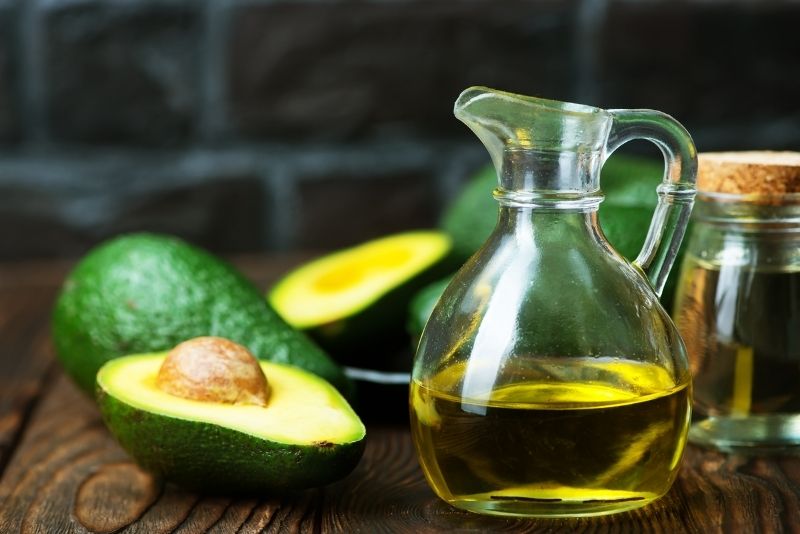
Like olive oil, avocado oil is made by extracting the oil from the pulp of avocado fruits. Experts say (by that, I mean myself) if you start using this substitute, you might never look back at vegetable oil.
It has a slightly higher smoke point than extra virgin olive oil (325°F), which makes it ideal for sautéing and frying.
Avocado oil also contains oleic acid, a monounsaturated fatty acid linked to lower cholesterol levels.
It has a rich, nutty flavor, making it an excellent choice for baking or using herbs in sautéed dishes.
6. Hempseed Oil
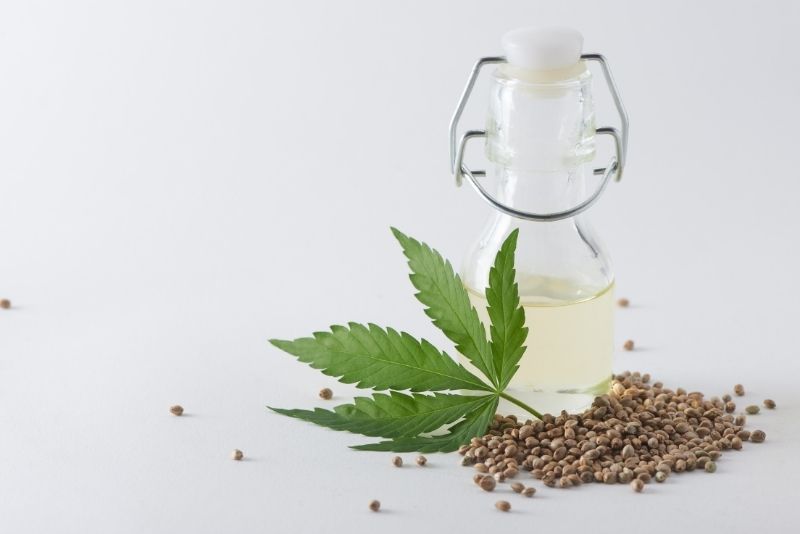
Hempseed oil is also pressed from seeds, but instead of coming from the pulp of fruits, it comes directly from the hemp plant. It’s another healthy vegetable oil substitute that is very easy to find at your local health food store.
Hempseed oil has a high smoke point (415°F), which makes it an excellent choice for sautéing or frying, but it also makes it a bit expensive because you use it much more quickly than other oils.
Nutritionally, hempseed oil is loaded with healthy fats and is one of the best plant-based sources of essential fatty acids.
Some people even drink it to improve their overall health, claiming it can treat various conditions like depression and chronic pain.
7. Butter
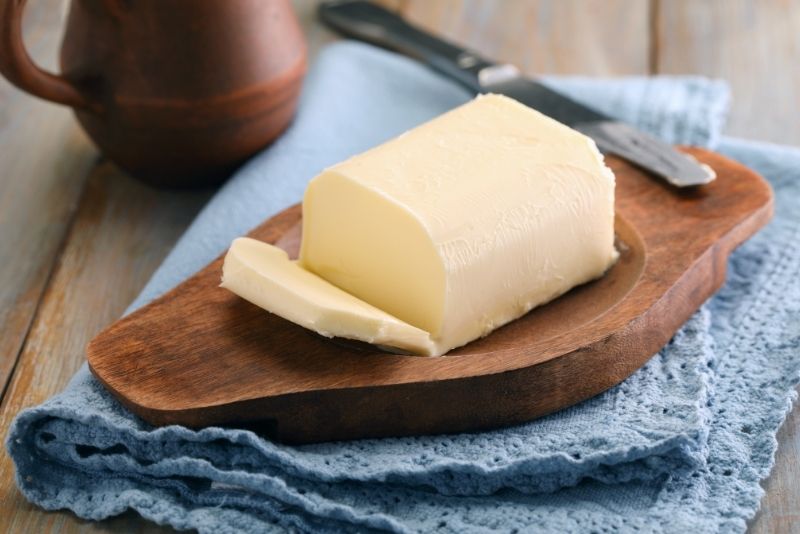
Butter is sometimes called “nature’s vegetable oil” because its flavor and texture are similar to vegetable oil.
Like all the other substitutes on this list, it has a high smoke point (around 400°F), which makes it very easy to use for pan-frying, sautéeing, and roasting.
Moreover, butter is a baking staple and is hard to replace with another ingredient. You can use melted butter for any baking recipe, such as bread, cookies, muffins, etc.
Butter contains saturated fat, which raises cholesterol levels, but moderate portions (like what you’d find in one stick of butter or margarine) won’t have any adverse effects on your health.
8. Applesauce
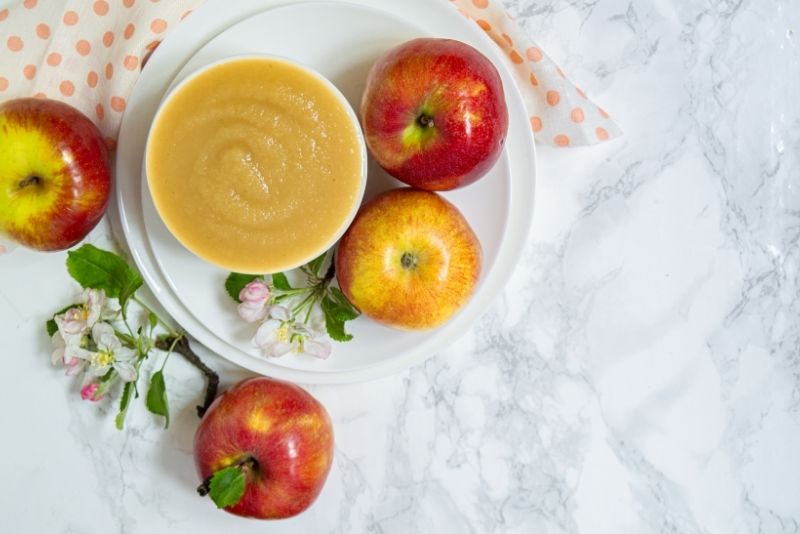
Applesauce is often used in baking recipes that call for vegetable oil. It doesn’t have the same texture or flavor as oil, but it can be used easily and works well in many recipes, including fruitcakes and muffins.
It adds moisture to your baked goods and surprisingly has fewer calories than vegetable oil.
In terms of taste, applesauce is very mild and adds a slightly sweet taste to your food, making it ideal for delicate baked goods like cakes and cookies.
9. Pumpkin Seed Oil
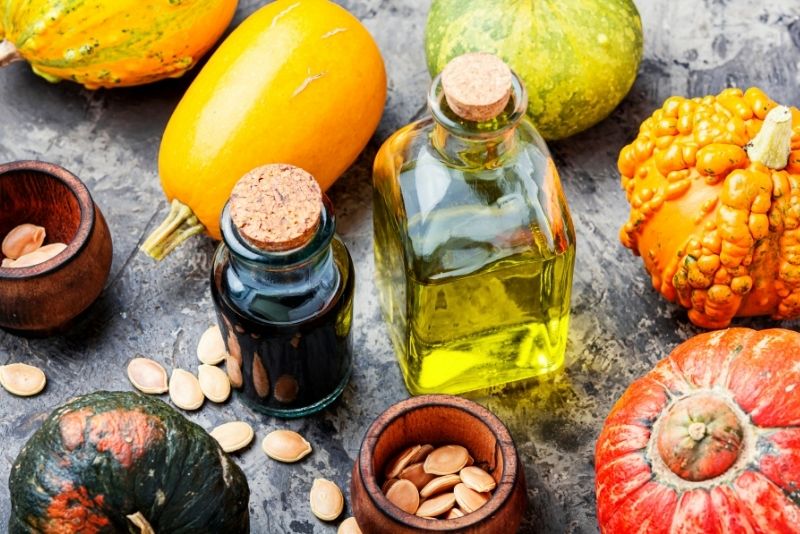
Another healthy alternative to vegetable oil, pumpkin seed oil, has a very high smoke point (440°F), making it an excellent choice for deep-frying or sautéeing foods.
It also contains many healthy fats, including omega-3 fatty acids and vitamin E.
The best part is that pumpkin seeds are very inexpensive, so you can use pumpkin seed oil to give your food a unique flavor and keep costs low.
10. Sesame Seed Oil
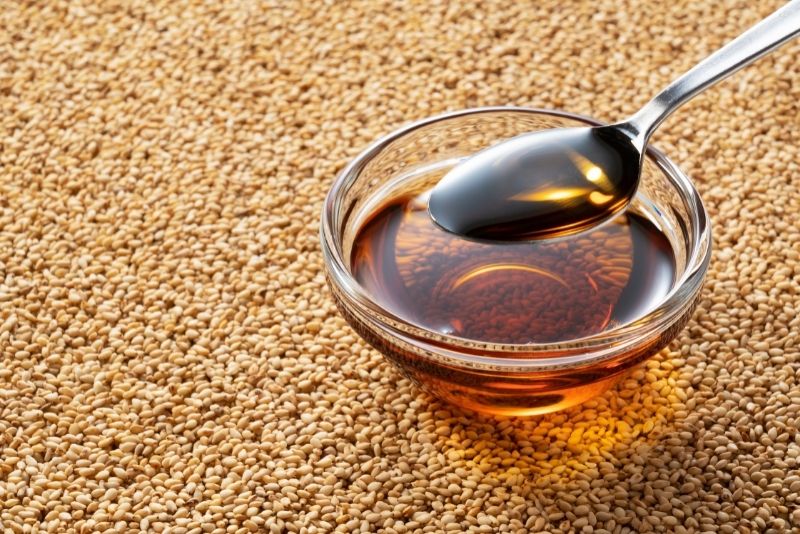
The sesame seed oil has an intense nutty flavor making it a delicious substitute for vegetable oil when used in Asian-inspired dishes. But it might be too overpowering for people who prefer less flavorful foods.
The good news is that sesame seed oil contains many vitamins and minerals, including calcium, magnesium, iron, and copper.
The bad news is that the high levels of polyunsaturated fats can become rancid quickly if exposed to light or heat, so sesame seed oil should only be kept in the dark bottles and refrigerated after opening.
11. Almond Oil
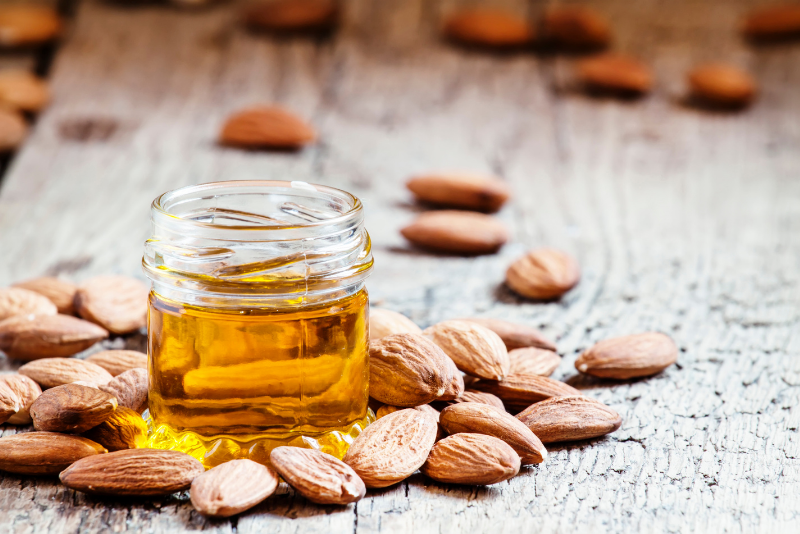
If you want to try nut oil for your next cooking project, you should definitely consider almond oil. It has a lighter flavor than other nut oils, and the texture is similar to that of vegetable oil.
Unlike other oils, it doesn’t have a high smoke point making it unsuitable for high-temperature cooking. However, it is an excellent vegetable oil replacement for salad dressing and cold applications.
But the best part is that it’s rich in vitamin E and contains lots of monounsaturated fats, which have been linked to healthy hearts.
12. Peanut Oil (High Oleic)
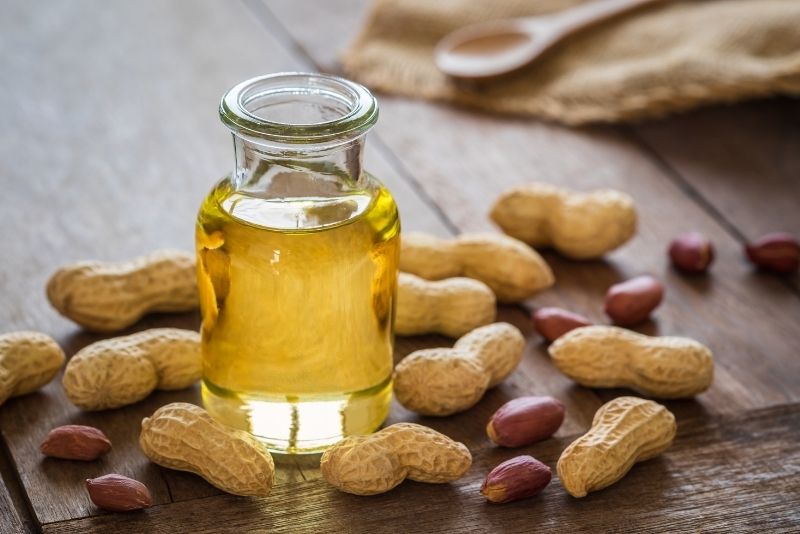
Peanut oil may be one of our favorite peanut-based foods because it’s so delicious and can also be used as an alternative to vegetable oil.
The problem with most edible peanut products is that they contain saturated fat, which can interfere with your heart health if consumed in large amounts.
But another variety called “high oleic” has been bred to have only unsaturated fats.
Peanut oil has a high smoke point (450°F) and can easily be used for deep-frying, sautéeing, or roasting.
It tastes great on chicken, vegetables, and other lean proteins because it doesn’t interfere with their natural flavors.
13. Yogurt
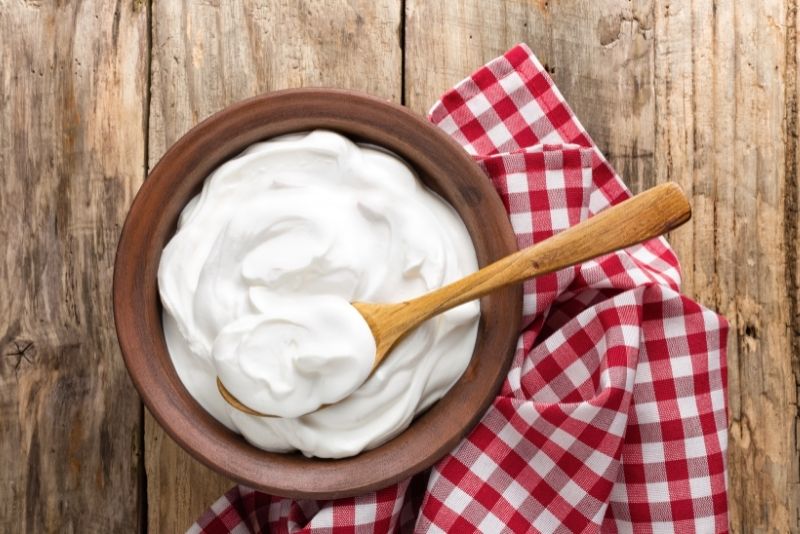
In terms of cooking, yogurt is an indispensable ingredient. Most Indian dishes call for yogurt because it gives them a tangy flavor without interfering with the other ingredients.
Moreover, since most yogurt contains healthy bacteria, you can use it as a substitute for vegetable oil in many recipes and keep the health benefits intact.
You can also use yogurt as a substitute for vegetable oil in baking recipes, which has the added benefit of adding more probiotic benefits.
Another great thing about yogurt is that it’s inexpensive and can be used to make other dairy products like cheese or sour cream.
14. Canola Oil
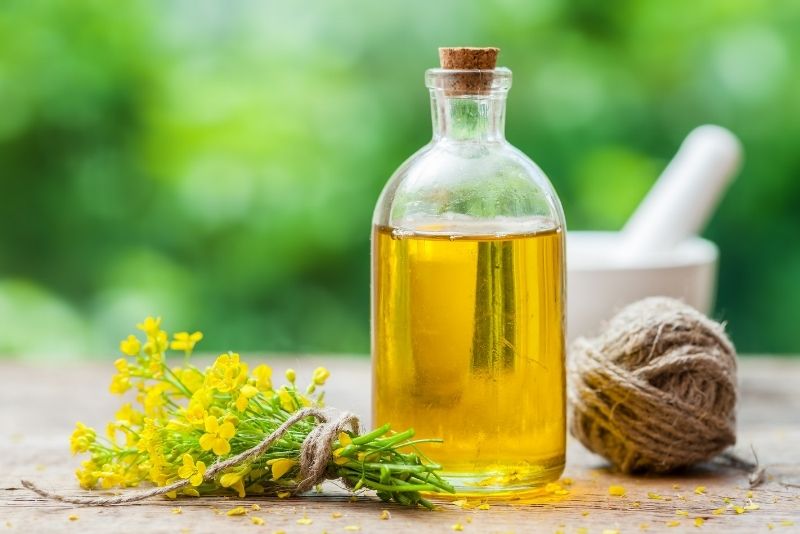
Canola oil is one of the few vegetable oils low in saturated fats, making it a healthier alternative to most other cooking oils.
Although its smoke point (450°F) isn’t as high as other higher-temperature alternatives, canola oil retains its nutritional content at normal frying temperatures.
15. Sunflower Oil
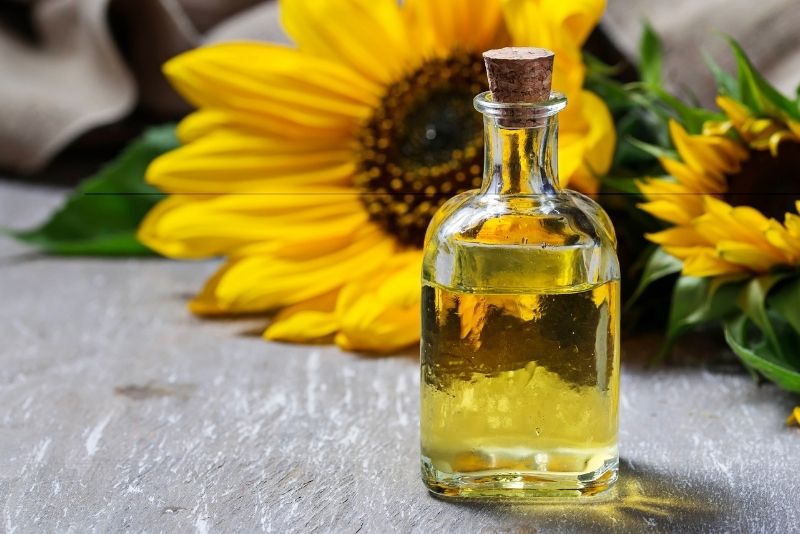
Sunflower oil is made from pressed sunflower seeds and has a pleasant nutty taste similar to peanut oil.
It is a great substitute for people who don’t have enough time to plan their meals ahead of time.
Sunflower oil stays at room temperature for several months and only needs to be refrigerated after opening.
The high smoke point is also suitable for deep-frying, pan-frying, roasting, or sautéeing.
16. Palm Oil
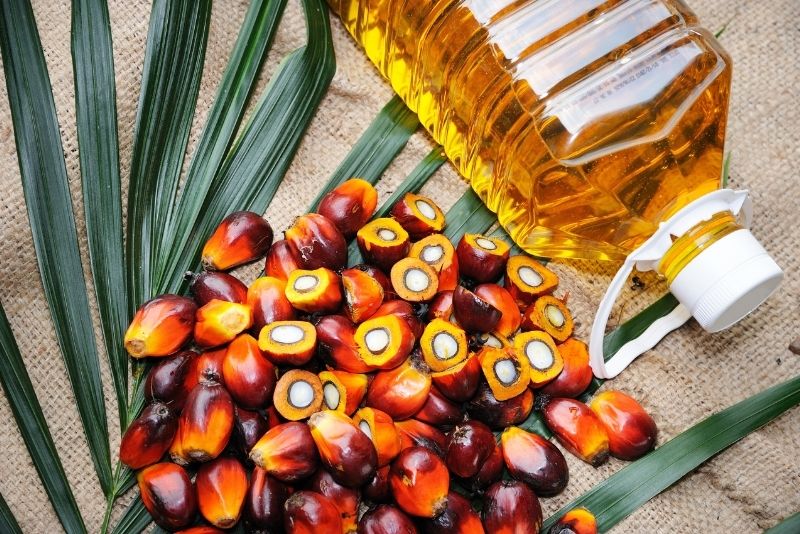
Palm oil is the tropical equivalent of canola oil. It doesn’t spoil quickly and has a high smoke point (450°F).
It is also high in antioxidants that can prevent the formation of free radicals, which might be involved in cancer and heart disease.
However, palm oil production has been controversial because it’s gained negative attention due to large-scale deforestation in Malaysia and Indonesia.
Read More: Palm Shortening Substitutes
17. Shortening
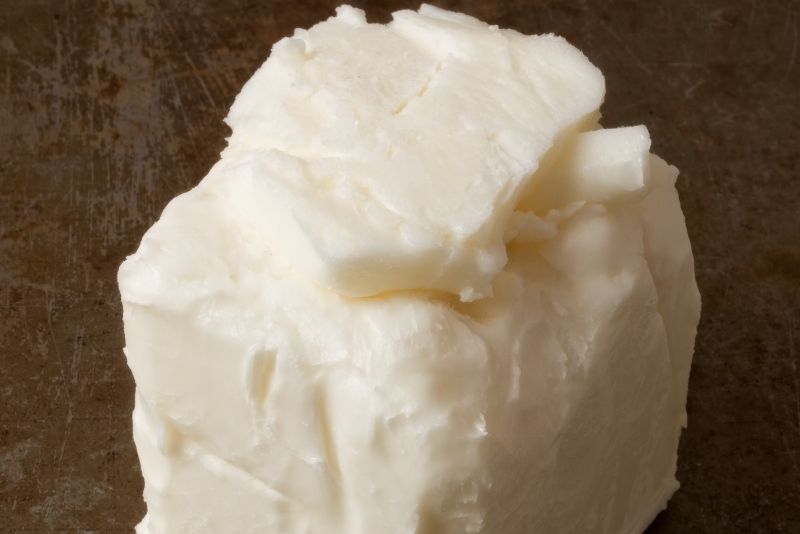
Vegetable shortening is made from hydrogenated vegetable oils, meaning they don’t contain any trans fats. It also has a high smoke point (450°F)
It’s a good substitute for vegetable oil and can be used for baking, sautéeing, or frying sweet and savory foods.
Vegetable shortening makes a great substitute for vegetable oil in baking because it is solid at room temperature and can be used in pound cake recipes. It also makes an excellent spread for low-carb bread.
It’s comparable to butter in terms of nutritional value and is high in saturated fats.
18. Safflower Oil
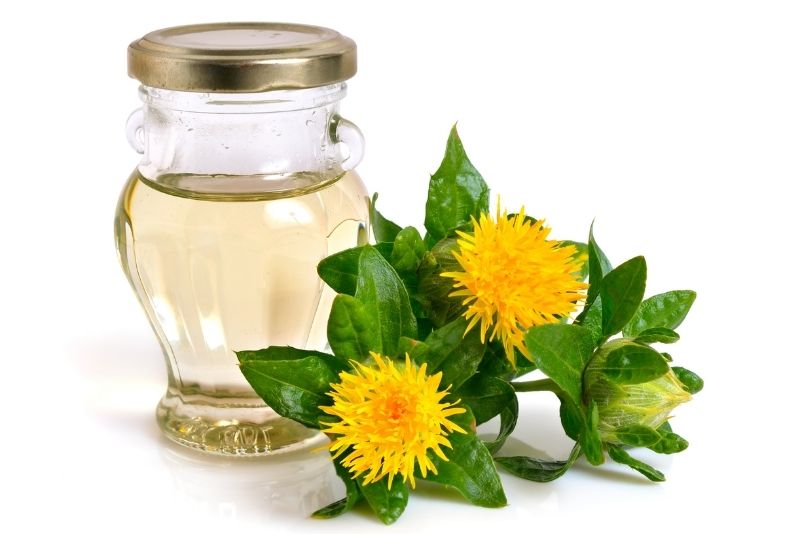
Safflower oil tastes like sunflower oil but is higher in linoleic acid (omega 6) than the latter. It has a slightly lower smoke point (400°F) than other comparable oils but can be used for deep-frying.
It’s a popular alternative in Europe and makes an excellent substitute for vegetable oil, butter, or other spreads like cream cheese if you don’t have the time to plan ahead.
19. Mashed Fruit or Fruit Puree
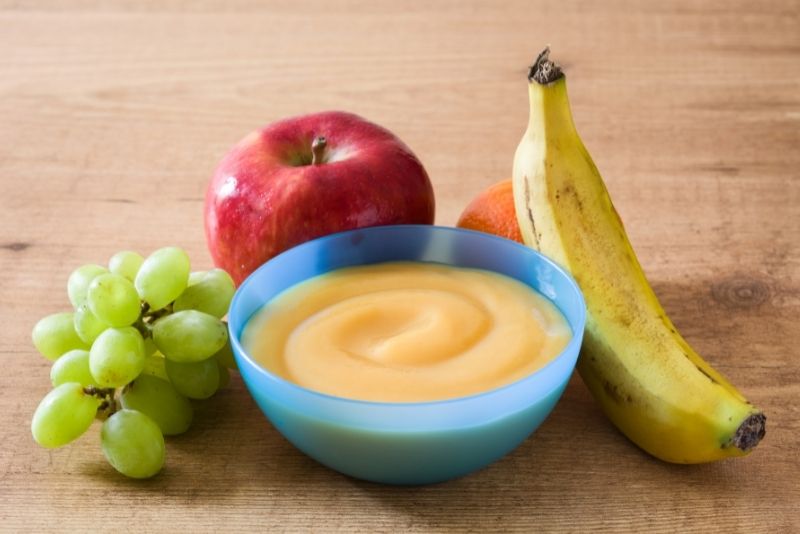
Mashed fruit or pureed solid fruits like apples, apricots, or prunes are excellent substitutes for vegetable oil in baking.
Since they already have a high amount of natural sugar and fiber, you can use them to make low-sugar cakes.
The only drawback is that you must plan ahead of time because mashed fruit doesn’t keep very well if it’s not refrigerated.
What is Vegetable Oil?
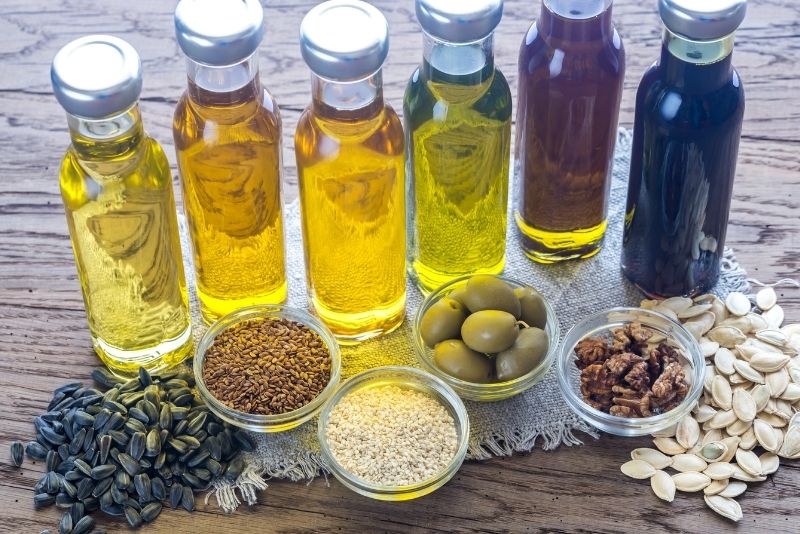
Vegetable oil is a cooking oil that comes from the fatty portion of plants. It’s extracted from plants high in triglycerides, a type of fat or lipid.
Since vegetable oil contains liquid fats, it’s oftentimes not good for high-heat cooking but ideal for baking at room temperature and lower temperatures. Also, it has a neutral flavor, making it ideal for most recipes.
The biggest reason behind its popularity is that vegetable oil is affordable, convenient, and readily available in stores.
Frequently Asked Questions
What does vegetable oil taste like?
Most vegetable oils have a pleasant nutty taste and can be used interchangeably when baking or cooking. They don’t usually cause any off-tastes unless you use too much or burn them.
What is vegetable oil used for?
Vegetable oil is used for sauteing meat, frying potatoes, or dressing salad. It’s among the most popular choices when making low-carb pancakes and other low-sugar snacks.
Some vegetable oils are also used to make skincare products that contain high amounts of antioxidants.
Can I use olive oil instead of vegetable oil?
Yes, you can use olive oil in place of vegetable oil. Olive oil, in fact, is better than other cooking oils because it’s monounsaturated fat.
This means it lowers the total number of bad cholesterol in your bloodstream while increasing the good cholesterol.
Can I use canola oil in place of vegetable oil?
Canola oil and vegetable oils are a lot alike, so yes, you can replace vegetable oil with it.
It’s a healthy fat that helps lower overall cholesterol and contains monounsaturated fats.
Because canola oil has a higher burning point, it’s better for deep-frying than other oils. Canola oil is also one of the lowest-cost cooking oils, so it’s a popular choice among frugal shoppers.
Which vegetable oil is the healthiest?
Olive oil is also one of the healthiest oils you can purchase in the supermarket. Other options are avocado oil and sunflower oil.
Final Words
If you are trying to lose weight or eat a healthy diet, using these vegetable oil substitutes will help you achieve your goals.
Remember, vegetable oils are fats from various plants and, when used in moderation, can be beneficial for your health while satisfying your hunger cravings.